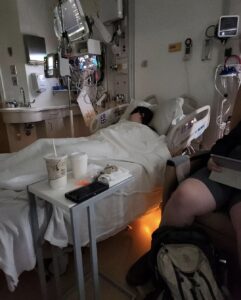Coping | Daily Life | IBD | Relationships

As someone in their 20s coping with multiple chronic illnesses, including Crohn’s Disease, there are a lot of things I want my healthy friends to know and understand! Of all of those things, these are my top five things that I wish my healthy friends knew and understood.
 People all over the world suffer from being tired every day. They might be tired because they didn’t get enough sleep, didn’t drink enough coffee, or didn’t rest enough. Being tired stinks. However, being tired is different from chronic fatigue. I could sleep for 12 hours (and I have) and still wake up feeling fatigued. I have been “tired” ever since I got diagnosed with IBD. Having a chronic illness is so tiring. I can rest all day, sleep all night, and still be fatigued. It’s one of the worst symptoms.
People all over the world suffer from being tired every day. They might be tired because they didn’t get enough sleep, didn’t drink enough coffee, or didn’t rest enough. Being tired stinks. However, being tired is different from chronic fatigue. I could sleep for 12 hours (and I have) and still wake up feeling fatigued. I have been “tired” ever since I got diagnosed with IBD. Having a chronic illness is so tiring. I can rest all day, sleep all night, and still be fatigued. It’s one of the worst symptoms.
The problem with chronic fatigue is that there is nothing I can do to alleviate it. For example, if I have a stomach ache, I can use a heating pad and lie down. For joint pain, I can continue going to physical therapy. I can’t get enough sleep to help with the fatigue. I can’t even drink coffee to help since caffeine isn’t good for IBD.
I know that being tired is a terrible feeling for everyone, but what my healthy friends need to understand is that when I say “I’m tired,” I mean that even though I’ve slept for 10 hours and have laid down all day, my body is still extremely fatigued and no amount of sleep, rest, or coffee will help me.
Managing a chronic illness, such as IBD, is a lifelong process. Even when you’re not in a flare you’re still managing your disease. There is so much to monitor. You’re keeping track of your symptoms, taking your medication, getting check-ups, getting medical testing, and much more. This isn’t something that you can just stop and forget about.
Managing the disease also means knowing all about your disease. When I was first diagnosed, I didn’t know anything about IBD. I took the time to learn about my disease and the symptoms that go along with it. I learned about the medication I was on and even researched other IBD medications. Doing all of this has helped me to manage my disease because I understand it better.
I have to manage my various doctors’ appointments. I see a gastroenterologist for my IBD as well as my primary care doctor. I manage my symptoms by keeping track of them daily in an app on my phone. Additionally, I eat foods that won’t exacerbate my symptoms. I keep track of all my medications and fill my pill packs every Sunday with the next week’s medication. For my biologic, Skyrizi, I call to make sure it will be delivered on time for my injection. I confirm that my medication list is up-to-date with all my doctors. I get my medical testing done when my doctors order it. There are just so many little things that I don’t think my healthy friends realize of when it comes to managing the disease.
For six out of seven years of my disease, it was pretty well managed. Even when it was well managed, I never felt 100% well. I would wake up fatigued every day and have joint pain. Ever since I was diagnosed, I’ve never been the same. I don’t remember what feeling healthy feels like. Now that I’m in a flare, my symptoms are much worse, and my “healthy” days still consist of fatigue, joint pain, stomach pain, and overall just feeling run down.
It’s very frustrating knowing that you’ll never feel 100% again. On my good days, it’s easy to overdo it because I want to get things done or have fun by going out. On my bad days, it sometimes gets frustrating because I would rather be doing something else than lying down all day.
Some days I can wake up feeling “well” and then feel progressively worse throughout the day. Other days, I can wake up and feel horrible, but then get better throughout the day. It varies widely day-to-day. It’s very anxiety-provoking to not know how I’m going to feel daily.
In the end, though, I never feel 100%. I don’t think I’ll ever feel 100% again with this chronic illness. Hopefully, as I get out of this flare, I can aim to feel 90% well on my “good” days.
IBD isn’t just my stomach hurting. It’s diarrhea, constipation, joint pain, fatigue, mouth ulcers, nausea, fever, loss of appetite, bloating, vomiting, and a lot of possible complications such as blockages, anal fissures, fistulas, anemia, vitamin deficiency, mineral deficiency, and more. It’s easy to look at me and think that I’m fine, and I’ve gotten so many “but you look good!” comments from people, but what my healthy friends need to know is that IBD has various symptoms. These symptoms can range from mild to severe. For me, it depends on the day. Some days, I can go without having diarrhea, and other days I’ll be stuck on the toilet for hours on end. Some days my stomach won’t hurt at all and other days it’ll be cramping 24-7. Sometimes, food doesn’t make me nauseous, but other days it does. It really depends day to day, but IBD isn’t just a stomachache.
Before I was diagnosed with IBD, I don’t remember having much anxiety. Once I was diagnosed, my anxiety really heightened. During my current flare it’s been so bad that I recently got on anxiety medication (which has been helping). Being diagnosed with a lifelong chronic illness out of the blue really messes with your mental health. It makes me scared it will happen again. I get anxious about what will happen with my health. The smallest new symptom scares me. For example, I recently had some rectal bleeding which rarely happens to me. I contacted my gastroenterologist, and they told me that “we will need to look into this further.” That sent me spiraling. What happens if the bleeding doesn’t stop? Why do they want to look into it further? How can I get the bleeding to stop? What’s causing the bleeding? These are just some of the questions that run through my head when my anxiety spirals due to my health.
I get anxious over doctor appointments, medical tests, and medical test results. I get anxious when I start new medication because I don’t know if I’ll have any bad side effects from it. This flare has really made me extra anxious because I had to go through three different biologics before finding one that has been helping.
With this chronic illness anxiety, I get anxious about the future. I think about what will happen if I get into a flare when I’m a mom one day or working full-time. I think about the possibility of passing IBD to my future child. I think about how I have to deal with this the rest of my life and that makes me anxious. I don’t think I’ll ever stop having anxiety when it comes to my health. It’s hard to detach that anxiety when the source of it will never go away.
I know that my healthy friends try their best to understand what I go through daily. Some do better than others, and I’ve lost some friendships due to the lack of understanding and empathy that they contributed to the friendship. It’s hard to understand something that you’re not going through yourself.
 Born and raised in Pennsylvania, Emily was diagnosed with severe Crohn’s Disease in 2016. Emily suffers from other chronic illnesses such as IBS, PCOS, chronic migraines, sinus issues, and interstitial cystitis. Being almost 25 now, Emily is going to pursue her master’s degree in education starting this summer. She currently works as a substitute teacher. Outside of working, she enjoys traveling, spending time with loved ones, and reading.
Born and raised in Pennsylvania, Emily was diagnosed with severe Crohn’s Disease in 2016. Emily suffers from other chronic illnesses such as IBS, PCOS, chronic migraines, sinus issues, and interstitial cystitis. Being almost 25 now, Emily is going to pursue her master’s degree in education starting this summer. She currently works as a substitute teacher. Outside of working, she enjoys traveling, spending time with loved ones, and reading.